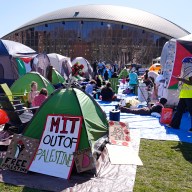Jamaica is a musical country, an auditory mecca of sound and soul. While this jewel of the Caribbean may be world famous for her Bob Marley beats, a trip there proves Jamaican music isn’t confined to reggae alone.
Dancehall music, loosely defined as high-energy rap with a Reggaeton rhythm, is extremely popular among local youth. Kingston, the island’s capital and largest city, is one of the best places to check out this trend, live and in-stereo.
“Dancehall speaks to the concerns, the aspirations and problems of the inner city. It’s a way of negotiating the issues … a way for young people to grapple with things that are of major concern to them,” said Clyde Mckenzie, a well-known local musicologist and judge of the Jamaican version of American Idol.
For a chance to experience dancehall music as it’s meant to be heard, I travelled to Weddy Weddy, a nightclub event held every Wednesday in an arena-like haunt called a “dance hall.” Located on a gritty avenue in Uptown Kingston, hundreds of twenty-somethings regularly go there to dance into the early morning.
With its pounding sound system, free cover and unrelenting energy, Weddy Weddy not only opens its doors to Jamaican club kids, but also draws adventurous young travellers.
I was curious about the Kingston club scene and the part that dancehall music played within local culture, so I slipped into appropriate club attire and set out to explore.
In a country with one of the world’s highest murder rates per capita, I was nervous about my late night expedition, but I was assured by my local contacts that tourists are welcome and safe at Weddy Weddy.
Walking in, I was greeted by friendly bouncers, blaring music and a mushroom cloud of ganja, a smell that permeated throughout the club.
The party gets going pretty late in Kingston, and by 12:30 a.m. the crowd began trickling in. A DJ spun vinyl as girls in pink booty-shorts broke into gymnast-like moves — apparently, the latest tracks often inspire new forms of urban dance.
Weddy Weddy is a fun and inclusive scene to witness but, with all the excitement, it’s easy to forget the controversy surrounding the music itself.
McKenzie told me the genre has come under attack in the past few years. Critics of the music have called some its lyrics misogynist and homophobic; the content has even been blamed for Jamaica’s alarming murder rate and epidemic of violence, advocating a ban on dancehall artists altogether.
While McKenzie knows about this backlash, he argued that “people from the outside may find the music distasteful only because they don’t understand all the nuances of Jamaican culture.”
Visiting Weddy Weddy is a great way for tourists to listen to the music in question, speak with the people and judge for themselves. During my time in Kingston, I learned that dancehall music is the evolution of Bob Marley’s reggae, it’s the popular genre of today and it plays an integral part in Kingston culture — for better or worse.
Julia Dimon is co-host of Word Travels, airing Sundays at 8:30 p.m. EST on OLN; juliadimon.com.
















